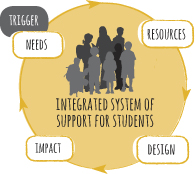The primary outcome for New Zealand students (described as the vision in the New Zealand Curriculum and Te Marautanga o Aotearoa) is for all students to be confident, connected, actively involved, lifelong learners.
Teachers and school leaders need the capability to support students to reach this outcome. The overview of Best Evidence Synthesis (BES) findings / He Tirohanga ki ngā kitenga o He Kete Raukura describes the teaching, teacher professional learning, educationally powerful relationships, and leadership capabilities needed. Specific curriculum and content knowledge is a critical part of this capability.
Tools
There are a number of tools to support an inquiry into effectiveness – to identify performance and capability. The tools are grouped around an inquiry into supporting particular groups of students (achievement and qualitative data would have signalled the area needed for review).
- The self-review tools have been trialled with schools and provide guidance in their use.
- The ERO indicators have come from the national reports.
The key tool for all schools will be:
School Evaluation Indicators 2015 (Trial)
Achieving equity and excellence of education outcomes for all children and young people is the major challenge for the New Zealand education system.
The new effective practice indicators have been developed working with expert advisers and drawing on the best evidence of what really works to achieve equity and excellence. These indicators reflect new research and evidence and we are confident that using the indicators to adapt practice will raise student achievement.
The following tools are context specific:
The Quick Start Guide for The self-review tool for schools: Focus on students achieving below curriculum expectations in literacy (years 1–8) provides strong guidance that can be applied to the use of any of the tools listed below.
Year 1-10 English language learners
Self-review tool for schools: Focus on students achieving below curriculum expectations in literacy (years 1-8)
This tool designed by schools in collaboration with the MOE, supports understanding of what to achieve and what to focus on next. The quick start guide suggests how to start, and how to explore the evidence.
Year 1-10 students below reading and writing expectations
Self-review tool for schools: Focus on students achieving below curriculum expectations in literacy (years 1-8)
A self-review tool to support schools to better understand what they need to achieve and what they should focus on next.
ERO literacy and mathematics in years 9 and 10: Using achievement information to promote success (July 2012) (criteria for effectiveness)
This ERO report evaluates how effectively schools use literacy and mathematics achievement information to improve learning for years 9 and 10 students. Use the set of criteria (appendix 2) to determine what effective practice in your school looks like.
Year 1-10 students below mathematics expectations
ERO Mathematics in years 4 to 8: Developing a responsive curriculum (ERO February 2013) (self-review indicators)
This ERO evaluation used the mathematics learning area and associated standards to look at what schools were doing to raise the achievement of students in years 4 to 8. Use the self-review indicators (appendix 3) to determine the effectiveness of your school's mathematics curriculum.
ERO literacy and mathematics in years 9 and 10: Using achievement information to promote success (July 2012) (criteria for effectiveness)
This ERO report evaluates how effectively schools use literacy and mathematics achievement information to improve learning for years 9 and 10 students. Use the set of criteria (appendix 2) to determine what effective practice in your school looks like.
Underachievement in priority groups of students - Māori
Measurable Gains Framework tools
These self-review tools provide common definitions and measurements of effectiveness in relation to Māori learners enjoying and achieving education success as Māori, and will support schools to gather and interpret their own information.
Students with particular strengths and needs whose teachers need support
Gifted and Talented: Meeting their needs in NZ – self-review
These self-review questions (p. 84) can be used as a starter for inquiry to help schools develop and review their approaches to meeting the needs of gifted and talented students.
Students with particular strengths and needs who need classroom support
Inclusive practices self-review tool
The Inclusive Practices tools support schools to promote and display inclusive education practices. Schools can confidentially store data, access reports of their data, find suggestions for next steps and actions, and track changes over time.
Wellbeing@school tool
The Wellbeing@School tools explore how different layers of school life contribute to creating a safe and caring climate that deters bullying.
Curriculum development years 1 - 10
Career Education Benchmarks – Year 7 and 8
A self-review tool for schools to assess and improve the quality of their career education for year 7 and 8 students.
Career Education Benchmarks – Secondary
A self-review tool for secondary schools to assess and improve the quality of their career education programmes and services.
Return to top










